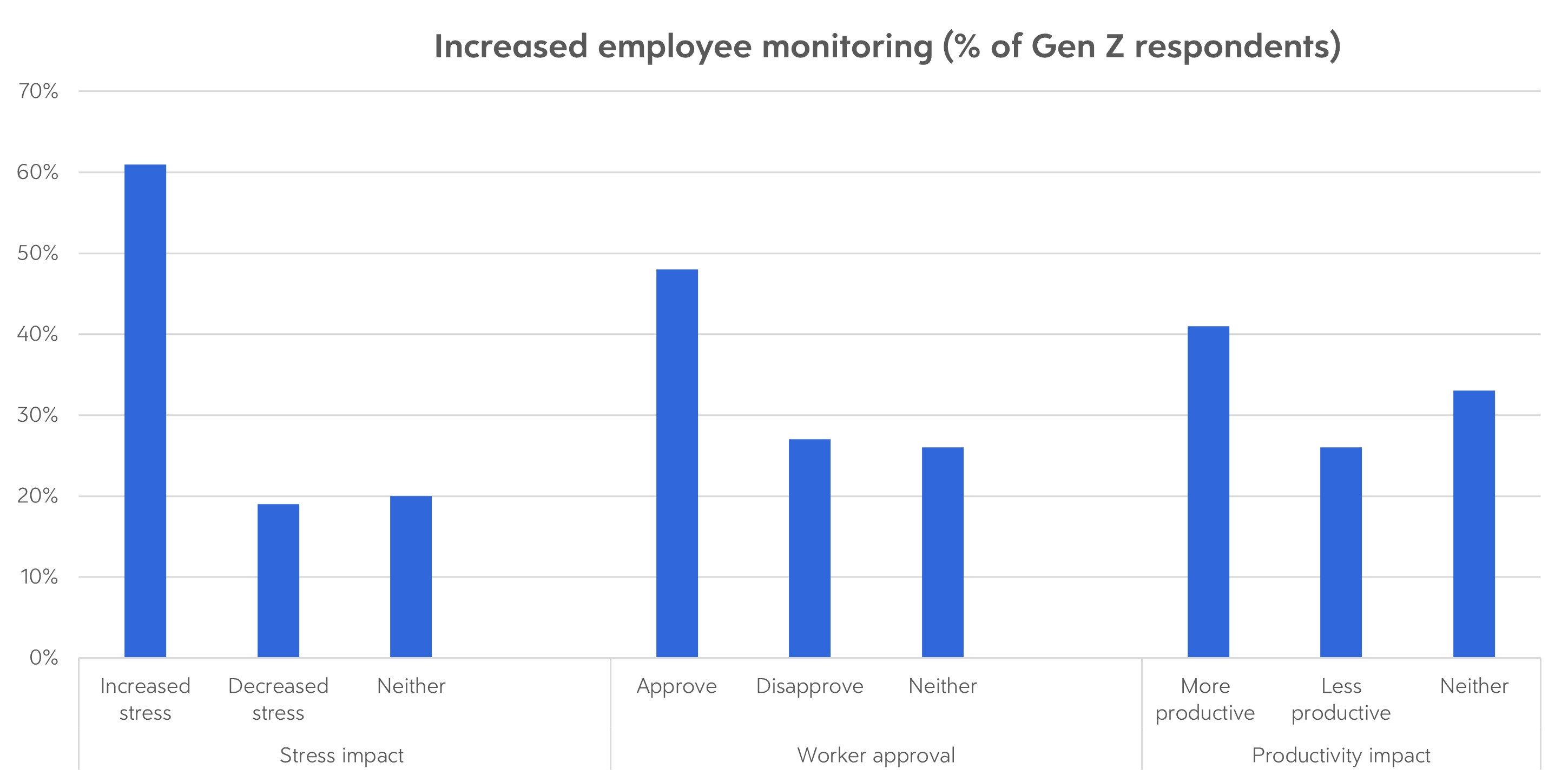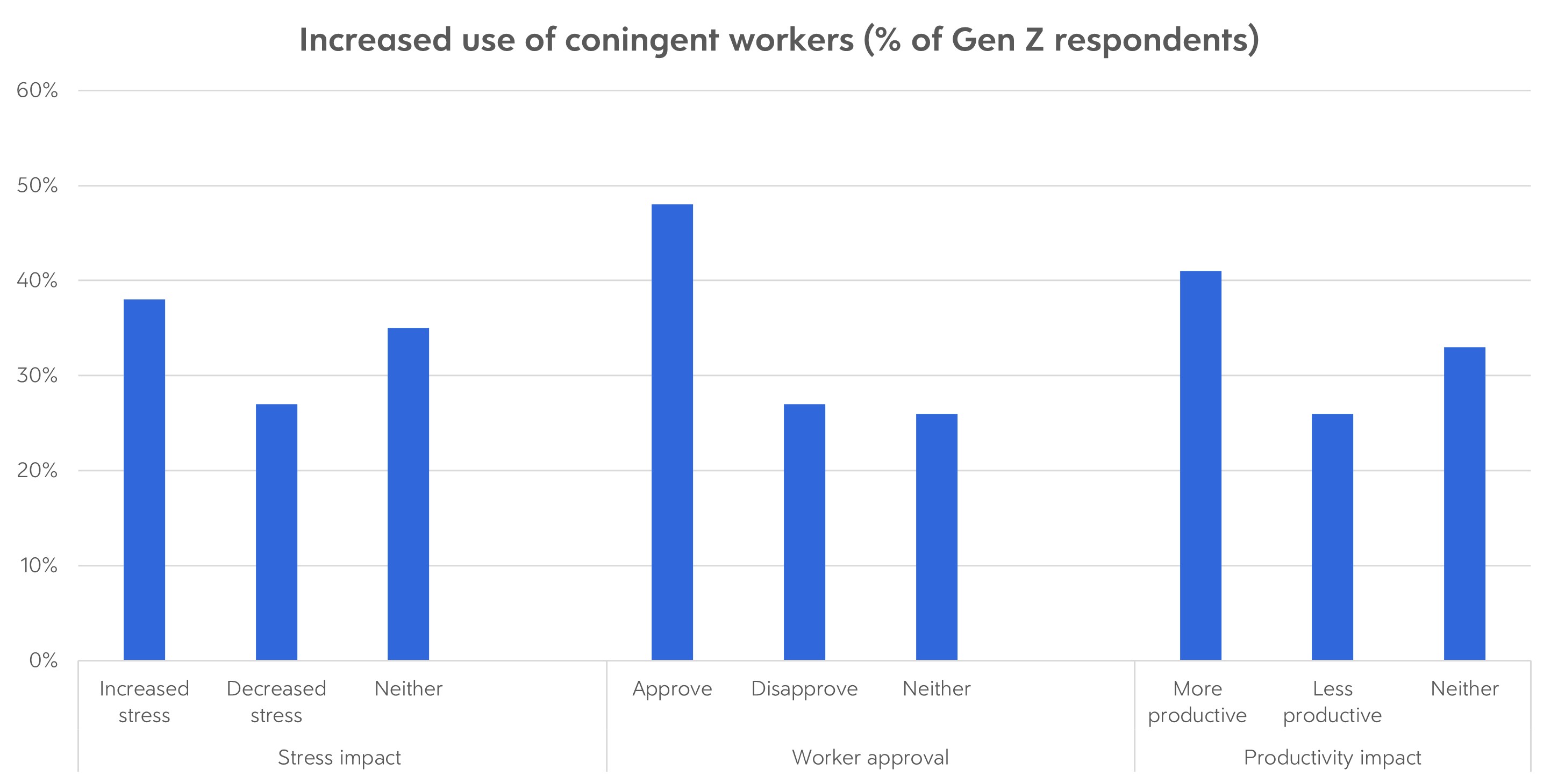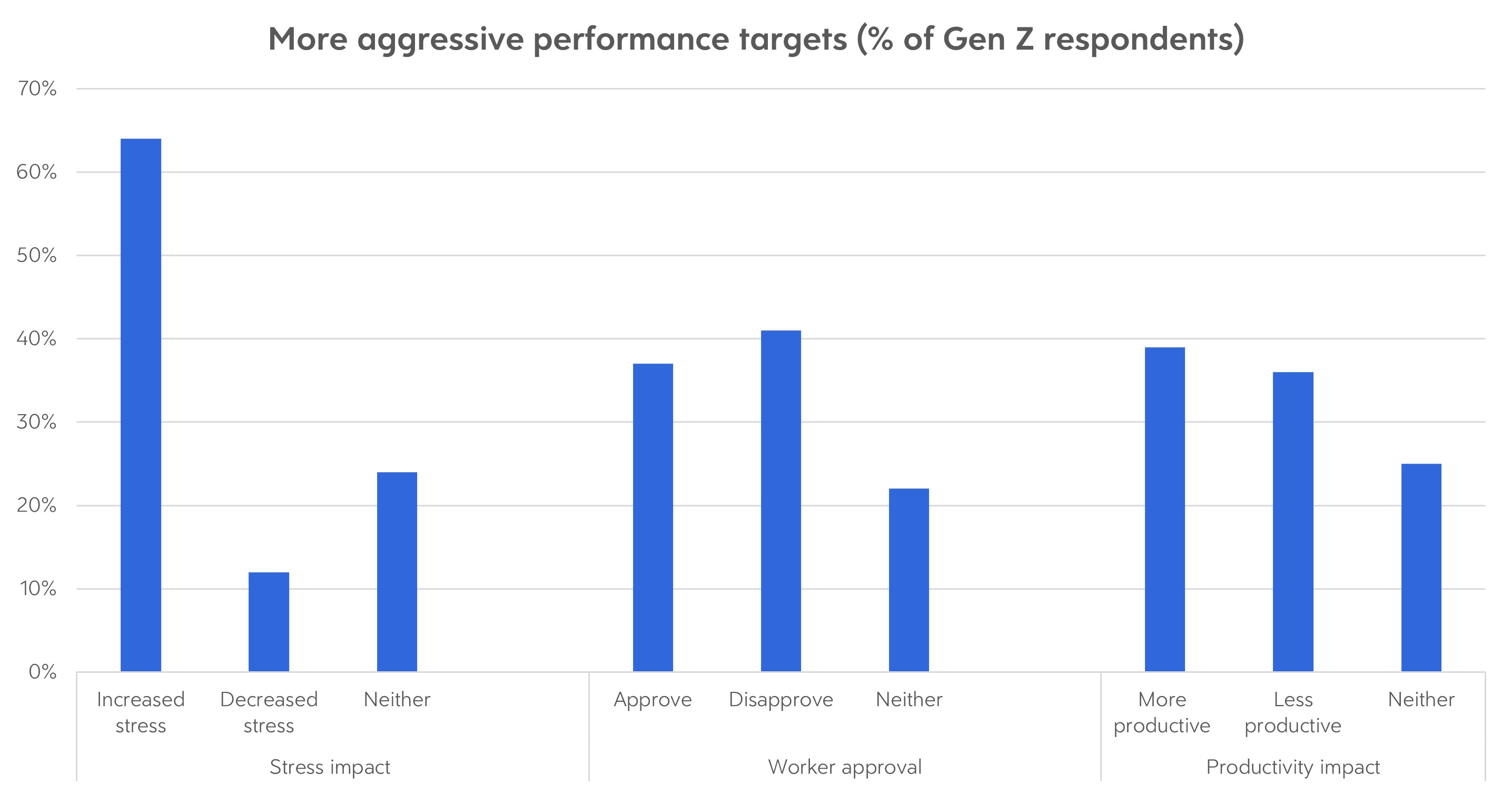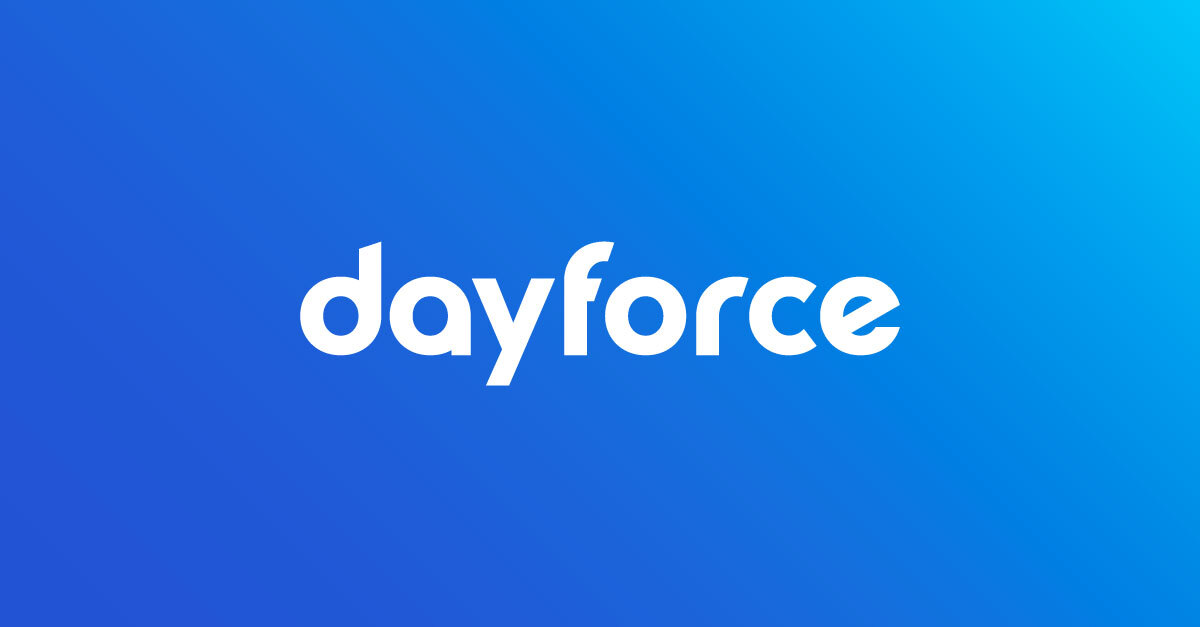What we have wrong about Gen Z workers
Look anywhere today and you’ll find commentary on Gen Z being too fragile and undisciplined to thrive in the workplace. Our data tells a different story.

Table of Contents
The media landscape abounds with hot takes on the attitudes and preferences of Gen Z. Some highlight this generation’s passion for social issues and climate justice, while others warn of the impact that increased anxiety and depression are having on this group as it enters the workforce. The spread of terms like “quiet quitting,” “lazy girl jobs,” and “bare minimum Mondays” have painted the picture of a typical Gen Z worker who shirks traditional employee standards and is unprepared for adulthood. Some commentators have even argued that this generation’s emotional fragility marks a “crisis” for workplace culture and social cohesion.
These perceptions have a significant impact on the prospects of Gen Z workers today. Research has found that 38% of US managers, directors, and execs avoid hiring recent college grads in favor of older employees. A significant number of these respondents say they they avoid hiring Gen Z applicants because these workers are too easily offended (58%), lack professionalism (57%), don't respond well to feedback (55%), lack work ethic (52%), and have poor communication skills (52%). But just how accurate or complete are those perceptions?
We analyzed data from Dayforce’s 14th Annual Pulse of Talent study to better understand Gen Z’s attitudes toward work. We identified four key findings that defied stereotypes and can have a significant impact on how companies help these workers thrive.
Finding #1: They’re not that fragile
With all the mainstream concerns about Gen Z’s emotional fragility, many might think that this group would go to any lengths to avoid stress. Yet our study found multiple instances where Gen Z workers were more likely to approve of workplace changes that actively increased their stress. We dug deeper into the findings to understand why.
Increased employee monitoring
It’s likely unsurprising that most Gen Z respondents (61%) said that increased employee monitoring raised their level of stress. Who likes to be watched, after all? But what is surprising is that these same respondents were more likely to approve of this change than disapprove. To repeat, Gen Z respondents were more likely to approve of increased employee monitoring.
Our study found multiple instances where Gen Z workers were more likely to approve of workplace changes that actively increased their stress.
But why would they do that? The answer might lie in Gen Z’s attitudes toward productivity. When asked if increased employee monitoring made them more productive, Gen Z respondents were significantly more likely to agree than disagree (41% to 26%, respectively).

These results show that many Gen Z respondents are willing to approve of workplace changes that increase their stress, particularly when these changes also increase their productivity. This is a significant insight for employers, as it demonstrates a willingness on Gen Z’s part to accept higher levels of stress if they feel it will help them make a positive difference at their company. But employers must also use this knowledge responsibly to avoid burning out their youngest cohort of workers.
Increased use of contingent workers
Like increased employee monitoring, the growing use of contingent workers resulted in higher reported levels of stress for Gen Z employees. Yet despite the increase in stress, Gen Z were nearly twice as likely to approve of this change than disapprove. To understand why, we delved deeper into Gen Z’s attitudes toward contingent work in general.
To start, Gen Z respondents in our study were more likely than any other group to say they were interested in becoming contingent workers themselves (roughly half). Their top reasons for wanting this arrangement were “More flexibility/work-life balance” (52%) and “The ability to work on something I’m passionate about” (52%). These positive attitudes toward contingent work can help explain their overall approval of having more contingent workers joining their companies.

But why then are they more likely to say that this same change increased their stress levels?
There could be multiple reasons for this increase in stress, from concerns about the job security of permanent employees to problems with how well their companies are incorporating these contingent workers into existing teams and workflows. To this second point, our 2023 Executive Survey showed that while eight in ten companies currently use contingent workers, over 90% of those companies say they have challenges using them.
This finding, combined with respondents’ attitudes toward increased employee monitoring, show that Gen Z workers do not see stress and productivity as mutually exclusive, and that they will not necessarily reject workplace changes that increase their stress. These findings are significant for employers, as they suggest that Gen Z workers are resilient and willing to take on challenges that can help them grow and become more effective in their work.
More aggressive performance targets
One would imagine that Gen Z’s willingness to accept more stress would eventually hit a limit, and that limit seemed to be reached when we asked them about their companies introducing more aggressive performance targets. On this topic, a clear majority of Gen Z respondents (64%) said this change increased their stress levels. But still, this same group was split on whether they approved (37%) or disapproved (41%) of the change. And in keeping with the trendline on other questions, these respondents were more likely to say that the change increased their productivity than decreased it.

These split feelings might highlight a tipping point where the stress caused by a workplace change might outweigh the perceived productivity benefits, and where Gen Z employees become more likely to disapprove than approve. Again, these findings are a far cry from the stereotypical, stress-avoidant Gen Z worker mentioned at the top of this article, and they provide useful insight for employers looking to balance employee wellness and performance.
Finding #2: They value face-to-face connection at work
One of the most common perceptions about Gen Z is that this group shies away from face-to-face connection in favor of texting and oneline communication. But our study yielded even more surprising findings here, the first of which was Gen Z’s preference for hybrid or in-office work compared to fully remote. In fact, Gen Z respondents were more than twice as likely to approve of hybrid/in-office working arrangements (55%) than disapprove (26%). These findings are consistent with other research, which has found the main reasons for this preference to be:
- Better career development opportunities
- Better social connections
- Opportunities for mentoring
- Better work-life boundaries
As with our other findings, employers should use these insights to better understand their Gen Z employees, and to offer more of the in-person work opportunities that will help this generation thrive.
Finding #3: They value flexibility (but not as much as millennials)
Discussions of the Gen Z workforce (and many videos on Tik Tok) highlight this group’s need for flexible work arrangements and scheduling. While our study confirmed that this group cared about flexibility more than workers aged 45+, it also found that Gen Z did not care about flexibility as much as millennials.
When we asked workers about their top priorities, Gen Z respondents were less likely than their millennial counterparts to deem “Flexible schedules” among the top three (58% compared to 66%). This result might be explained by millennials wanting more flexibility to take care of family or personal responsibilities, which is supported by the fact that Gen Z respondents were less likely to rate “Flexibility for personal responsibilities or illness” as important (46% compared to 51% of millennials).
As with our other results, these findings show that Gen Z workers are charting their own path, and employers can use this insight to inspire new approaches to managing and motivating this workforce.
Finding #4: They're worried about AI making people lazier
Gen Z is the first generation to grow up never knowing a world before the internet, smart devices, or social media. As a result, some observers might broadly blame technology for increasing rates of anxiety and depression among this group. But as this study’s results show, the type of technology a person uses makes all the difference.
Tech can help with stress
As part of our Pulse of Talent study, we asked all respondents about how new technology investments at their organization impacted their stress levels. In this instance, Gen Z was the most likely to say that this helped improve their stress levels (49% compared to 42% for ages 25-34, the next highest group). It’s important to note here that the question applied to all new technology investments, and that the ensuing gains in user experience and productivity were likely strong drivers of the reported improvements in Gen Z stress levels. Employers might wish to take note of this finding when they consider new investments that can both boost productivity and help manage the stress of their younger employees.
Concerns about AI
When asked specifically about artificial intelligence, only 19% of Gen Z respondents said they were concerned about their organization adopting this technology. Six in ten respondents in this group believed that AI could increase their productivity, compared to only four in ten after age 45.
However, when asked what their main concerns about AI were, Gen Z was more likely than any other group to cite “Making people lazier” (39%). This could be because Gen Z is the first generation to see their peers using this technology to write reports or academic papers, leading to a concern about how heavily people are relying on it. Combined with the earlier findings about stress and productivity, this result helps demonstrate how Gen Z workers hold much more nuanced views about stress, productivity, technology, and work ethic than mainstream conversations give them credit for.
Key takeaways
This year’s Pulse of Talent study offers significant new insights on Gen Z workers, showing that this group is more resilient than many people think, and that in many cases, they’re even more concerned about productivity and work ethic than their older colleagues.
Looking ahead, employers can use these findings to:
- Think of new technology as an investment in employee mental health—not just the direct investments like telehealth, but in productivity tools overall.
- Develop a more nuanced understanding of Gen Z's attitudes toward stress, productivity, passion for their work, and willingness to take on new challenges.
- Be more proactive in offering mental health and stress management supports to younger workers, who might become burnout risks if they continue accepting higher levels of stress to support productivity.
- Discuss AI with younger workers to determine whether they would prefer stronger investment in this area, and for which applications.
As our Pulse of Talent study shows, the combination of confidence and willingness to take on new challenges can be a vital point of connection between managers and Gen Z workers. With a deeper understanding of this generation's needs and preferences, employers are in an ideal position to balance worker wellbeing with company productivity, making work life better for all.
You may also like:
Ready to get started?

